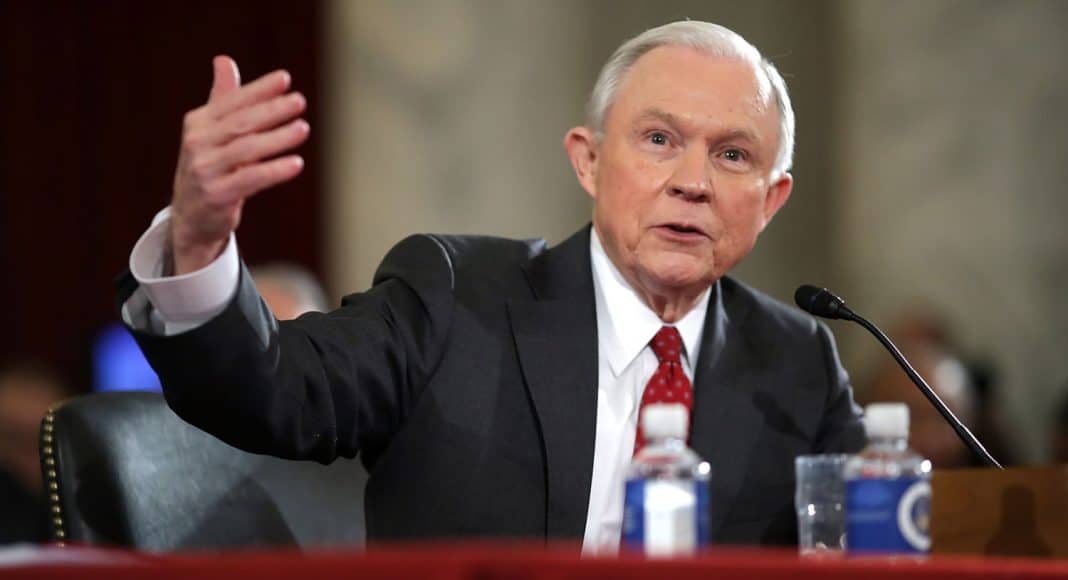Sen. Jeff Sessions (R-Ala.) rope-a-doped his way through two days of grilling during his confirmation hearing without suffering anything close to a knockout blow, or really saying much about legal marijuana.
President-elect Donald J. Trump’s embattled nominee for Attorney General, an ardent opponent of legal marijuana, provided vague answers to questions about his approach to the issue. Despite the grilling from Democratic senators, Sessions suggested that he would not radically shake the status quo. But there is a lot of tea-leaf reading in between the lines.
- RELATED STORY: Sessions Needs To Think Like An Accountant, Not An Attorney
“I won’t commit to never enforcing federal law,” said Sessions, responding in a double negative when asked if he would spend precious federal dollars and manpower to prosecute people for consuming cannabis in accordance with state laws. “But absolutely it’s a problem of resources for the federal government.”
Sessions also suggested that the guidelines provided by his predecessors Eric Holder and Loretta Lynch were “truly valuable” in maintaining an appropriate balance.
The testimony that made the biggest headlines occurred on Tuesday when Sessions challenged Congress to do its job as the legislative branch of the federal government and pass a law if it wants to put an end to the incongruity of state and federal policies. Until then, he maintained, he was adamant that he would follow current law “in a just and fair way.”
“It is not so much the Attorney General’s job to decide what laws to enforce,” Sessions said. “We should do our job and enforce laws effectively as we are able.”
Some policy wonks and marijuana legalization advocates were cautious in their criticisms of the testimony. On one hand, his answers were innocuous and non-threatening. But on the other hand, Sessions has a decades-long reputation of anti-marijuana rhetoric.
- Marijuana Majority: “It’s a good sign that Sen. Sessions seemed open to keeping the Obama guidelines, if maybe with a little stricter enforcement of their restrictions,” said Tom Angell, chairman of Marijuana Majority. “The truth is, his answer was skillfully evasive.
- Drug Policy Alliance: “Jeff Sessions is a nightmare. He is a threat to progress, especially marijuana reform, sentencing reform, and asset forfeiture reform,” said Bill Piper, senior director of national affairs for the DPA. “It is clear that he was too afraid to say the Reefer Madness things he said just a year ago, but he left the door open to interfering in the states. I think he will follow Trump’s lead, whichever way that goes” Piper said, adding that Sessions’ performance was “wishy-washy at best.”
- National Organization for the Reform of Marijuana Laws: “If anything, his comments are a cause for concern and can be interpreted as leaving the door open for enforcing federal law in legalized states,” said Erik Altieri, executive direction of the NORML. “If Sessions wants to be an Attorney General for ALL Americans, he must bring his views in line with the majority of the population and support allowing states to set their own marijuana policies without fear of federal intervention,” he said.
- Marijuana Policy Project: Sessions “chose not to commit to vigorously enforcing federal prohibition laws in states that have reformed their marijuana laws. He also recognized that enforcing federal marijuana laws would be dependent upon the availability of resources, the scarcity of which poses a problem,” said Robert Capecchi, director of MPP.
“We need grown-ups in Washington to say marijuana is not the kind of thing that ought to be legalized, it ought not to be minimized, that it is in fact a very real danger. To make it socially acceptable creates increased demand and results in people being addicted and being impacted adversely.”
Even more alarming is his belief that America’s $1 trillion War on Drugs was a success.
If confirmed — which seems almost a forgone conclusion at this point — Sessions would run the Department of Justice, the agency that enforces federal marijuana law. He would have the authority to roll back decades of progress in marijuana policy.
But would Sessions — of Trump for that matter — want to wage a battle against eight states that have legalized full adult recreational use and another 29 states with medical marijuana programs? Cannabis is even legal in Washington D.C. It would appear to be a waste of resources to re-engage in this battle.
Polling is clear that the American people are in favor of legalization. States are collecting huge revenues from fees and taxes on marijuana sales. It is conceivable that Sessions would take a tepid, hands-off approach to the issue. At least one Congressman thinks so.
Rep. Dana Rohrabacher (R-Calif.), a legalization proponent, believes it would not be in Sessions’ best interest to interfere with states that have legalized marijuana on the books.
Rohrabacher is co-author of the Hinchey-Rohrabacher Amendment, which prohibits the Justice Department from spending federal funds to enforce the federal prohibition laws in states where medical marijuana has been legalized. Some legalization advocates express worry that there will be pressure applied to Congress to eliminate or change this rule. Rohrabacher dismisses such chatter.
“In terms of marijuana and legalization, I think that should be a state issue, state by state,” Trump said.
Incoming press secretary, Sean Spicer, agrees. “When you come into a Trump administration, it’s the Trump agenda you are implementing, not your own, and I think Sen. Sessions is well aware of that,” Spicer said.
Related Stories
[soliloquy id=”24090″]


